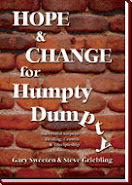
We are in the midst of The Fourth Great Awakening. It started with the uprising of the Baby Boomers in the Sixties and will hit a high peak when the Boomers start hitting Sixty and above. It started with the Jesus People revival and will impact society best when those who were touched by God back then share our non-material or spiritual values with the world.
As a minister, counselor and consultant I am influenced by the books and thinking of Robert William Fogel, a 1993 Nobel Prize winning economist. Dr. Fogel writes on the importance of understanding
Post-Modern ways to alleviate poverty and enhance a nation's economic strengths. His book,
The Fourth Great Awakening is very insightful. He writes persuasively about the distribution of “non-material or spiritual resources” to alleviate poverty in the 21st Century.
http://www.amazon.com/
Fogel suggests that we are in a new era of economic thinking. The things that keep people poor in America are not a lack of material resources but “spiritual” resources such as family values, education, thrift, sobriety, solid relationships, etc. As my dad always said, “Poor people have poor ways.” At the time we were very poor materially but we had a strong work ethic, good relationships with a supportive family, honesty, self responsibility, thrift, etc.
But I am very concerned. It seems that Evangelical Churches and Christian organizations are regressing back into a 1930's "Social Gospel Mentality" in their approach to alleviating poverty. Back then the main needs were definitely material and financial. When the Federal Government under FDR came up with all the programs to put people to work it was because they were without food, clothing and shelter even if their non-material values were excellent. Hard working Christian families had lost everything and FDR tried to "jump-start" things by setting up "make work programs".
The situation today is radically different. In order to move people up in the economic ladder they must be taught how to build solid relationships, learn to think differently and get out of the cycle of drugs, pre marital sex and unmarried mothers, abuse and divorce.
This is the opportune time to "Unleash Seasoned Believers" whose wisdom, insights and experiences can be transferred to the chronically poor. We can show them how to make the changes necessary to leave a legacy of health, wealth and stability.
What can a church do? "Equip the entire congregation to help themselves and offer support to others." (In the literature this is called, "The Psycho educative Model". Poverty arises primarily from mental, emotional and relational weaknesses. It can only be solved by improving the spiritual resources of the community not just the individual.)
The "Expert Model" is based on an outmoded, old fashioned idea that suggests poor people are victims and must be rescued by doctors, ministers, psychologists, medicine, money and smart people. This model may have worked in the past but they are failing now.
What not to do: Do NOT develop programs that see poor people as victims who must be rescued. That is a Model from the early 20Th Century and is a recipe for "Co-Dependence Disasters". The current "One Up Model and One Down Model" of Government Anti-Poverty Programs has failed and made poverty worse.
The Medical Model that dominates Psychiatry and Psychology has failed miserably. I developed and oversaw an in-patient psychiatric hospital and outpatient clinic. The greatest benefits comes not from the experts but from the other patients and the family. We in this profession know the research about what causes a good outcome and it is not just because we have the answers.
About 40% of all psychological advancement for those in psychotherapy comes from friends and family not the expert therapist. Only about 15% comes from the pills, the psychological interventions and the psychological/medical insights of the expert. Why would a cutting edge church with enormous spiritual resources want to mimic an outmoded clinical model?
But I am concerned because a lot of influential ministers are promoting the clinical/expert model. It won't work and many people will have their cycle of dependency deepened rather than alleviated.
Seasoned Believers need to use their resources wisely. It is wasteful to throw money at poverty. We must put our spiritual, mental and relational wisdom to work. Ministers, do not trade your deep spiritual wisdom for a "Bowl of psychological pottage".





No comments:
Post a Comment